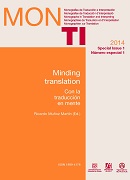The language-(in)dependence of writing skills: translation as a tool in writing process research and writing instruction
Article Sidebar

Main Article Content
Susanne Göpferich
Bridgit Nelezen
A pilot study was conducted in which 6 students with L1 German had to produce a German version of a text they had composed in their L2 English. The goals were to explore (a) in what respects the ability of advanced university English students to express themselves in their L2 English differs from their ability to do so in their L1 German, and (b) for which aspects of writing the implementation of translation exercises is useful as a tool to improve writing skills. The methods of data collection used were think-aloud and keystroke logging. In the analysis, special emphasis was placed on text-level errors as opposed to formal, lexical and grammatical errors. In their L1 versions, students were consistently able to avoid errors of implicitness and sense but displayed no improvements in other areas such as text coherence and functional sentence perspective. Though some of the errors could be attributed to the special requirements of the translation assignment, translation was also found to have certain advantages that make it a useful tool in writing didactics.
Keywords
Writing vs. translating, Writing in L2, Text-level errors, Academic writing, Translation as a tool in writing instruction
Article Details
How to Cite
Göpferich, Susanne; and Nelezen, Bridgit. “The language-(in)dependence of writing skills: translation as a tool in writing process research and writing instruction”. MonTi: Monografías de Traducción e Interpretación, pp. 117-49, https://raco.cat/index.php/MonTI/article/view/292851.